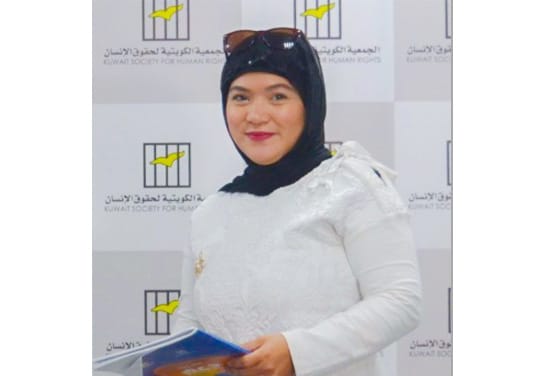By Faten Omar
KUWAIT: Migrant workers, who make up around two-thirds of the population of Kuwait, continue to face difficulties and legal constraints, and remain vulnerable to abuse despite labor laws that guarantee their rights. Kuwait Society for Human Rights (KSHR) provides several services to migrant workers who do not have adequate legal protections and remain vulnerable to abuse, forced labor and deportation for minor infractions.
Aisha Al-Bakit, Psychological Specialist and Registered Behavior Technician at KSHR, told Kuwait Times that KSHR started the "Together" project in cooperation with the US State Dept's Middle East Partnership Initiative (USMEPI) and the EU delegation to support workers and victims of domestic violence. "The project that started in December 2021 provides services for legal and mental health like counseling, assistance and educating workers about their rights in multiple languages (Arabic, English, Urdu, Hindi and Tagalog) through our hotline (22215150)," she said.
Bakit called on workers to submit complaints about violations of their rights. Lawyers and legal advisors will respond to their inquiries and complaints. The project aims to contribute to tackling wrong practices against migrant workers in Kuwait, as well as monitoring and documenting abuses they encounter.
"From December 2021 until March 2022, I received 340 complaints - 242 from females and 98 from males. Most cases are from domestic workers who suffer from rape, abuse and sponsors preventing them from going back to their country. Due to continuous deprivation of their rights, domestic workers get stressed and depressed, so we offer mental health services personally or via the phone when they cannot come to our location in order to not lose their jobs," Bakit said.
Migrant workers are not the only ones who complain about mistreatment, but also abused housewives. "I call them the silent community. I also handle all cases of women married to expat men who are abused. I handled five cases from 2021, and till now I am monitoring them. Many of them were beaten by their husbands, but they refuse to speak up. Thirty percent of the cases we receive are of abuse," she said.
Regarding health and mental issues, Bakit noted: "We cooperate with USMEPI to transfer complainants with health or mental issues for treatment in hospitals, and sometimes we get help from professors from the psychology department at Kuwait University for mental counseling. We also organize events and activities for depressed workers to release their stress to provide a positive model for the active participation of the civil society in supporting workers' rights."
After working hours, Bakit still feels the need to reach more people, so she goes on "field consulting" and roams the streets of Kuwait City to approach workers. "I go to Kuwait City looking for migrant workers who need help and someone to listen to them. I ask them to speak out and know their rights. I give them my number, and whenever they are ready, they know I will be there to listen," she said.
Around 1,000 migrant workers benefited from the services of the association during the first third of 2022 (776 legal consultations, 31 psychological support, 53 dispute complaints resolved between workers and employers, 80 women receiving free examination in medical centers, over 20 workers whose legal status was adjusted and chose either to leave Kuwait or transfer their residence.)
The most prominent complaints that were received by the society during the first quarter of 2022 are of final cancellations, retrieval of passports, cancellation and transfer, financial dues, late salaries, adjusting their status and health issues. Psychological and social support provided to migrant workers during the first third of 2022 reached 31 cases (14 females and 17 males).
The complaint procedure comprises of a number of stages. KSHR asks workers to submit a complaint to discuss their situation, and sometimes the sponsor will be asked to join if they are cooperative. Then the worker will be asked to fill out a form that discusses the issue they face (medical, passport confiscation, rest hours, pending or unpaid salary, physical abuse, sexual harassment or abuse, verbal abuse, illegal detention or completed contracts). The complainant will then be handed a body map to determine if the person has been abused. If there are any bruises, the worker will be transferred to the hospital to get a medical report.











